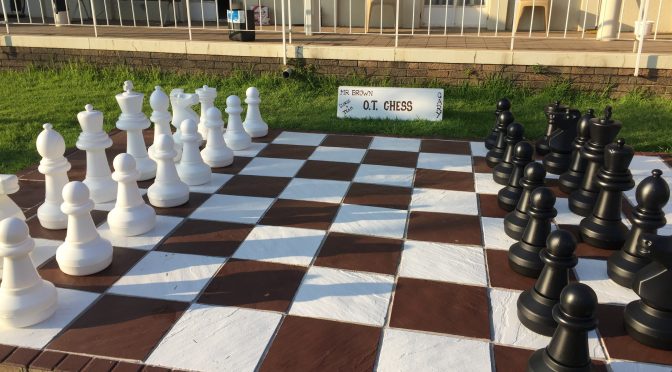Things are a lot more black and white at Wedge Gardens treatment centre these days.
The long-anticipated giant outdoor chessboard has been completed and is being enjoyed by the gentlemen at Wedge Gardens.
“A special mention needs to be made of those individuals who made yet another occupational therapy department (OT) project possible,” says Kendra Neethling, who heads up the OT department and played a big role in the project. “Our thanks go to Rand Aid CEO Rae Brown and the Rand Aid Association, groundsman George Vermeulen and his team, as well as the patients at Wedge Gardens.”
Leisure boredom – or unproductive free time – is considered a precipitating factor in addiction and substance use. The OT department at Wedge Garden strives to instil balance within the lives of the patients at the rehabilitation facility by stressing that through meaningful occupational engagement, an individual is better able to cope with life stressors, feel a sense of worth and meaning within society and find enjoyment in healthy and constructive activity participation.
“Not only is the chessboard a space for the gentlemen to learn to use their time in a productive manner, but it is an area at Wedge Gardens where they can learn social and cognitive skills,” says Kendra.
It is a known fact that substance abuse negatively impacts cognitive health. “A chessboard is a fantastic mechanism to promote cognitive skills such as concentration and attention, memory, problem solving, judgement and executive tasks. Furthermore, as the game requires at least two players, the patients at Wedge are exposed to social interaction, which aids communication and conflict management skills,” says Kendra.
The OT department believes that through the creation and completion of projects such as the chessboard, the patients at Wedge Gardens learn numerous skills on an ongoing basis.
As such, they were involved in the planning and construction of the project and the procurement of donations. “A sense of altruism is instilled in the patients because when they end their treatment programme, they leave having been a part of a project that can be used by future patients.
“I am exceptionally proud of my patients and the work they have done to complete another OT project. Through encouraging proactive use of the facilities at Wedge Gardens, we are equipping our patients with skills for the re-integration into society, which is fundamental to any recovery programme.”
